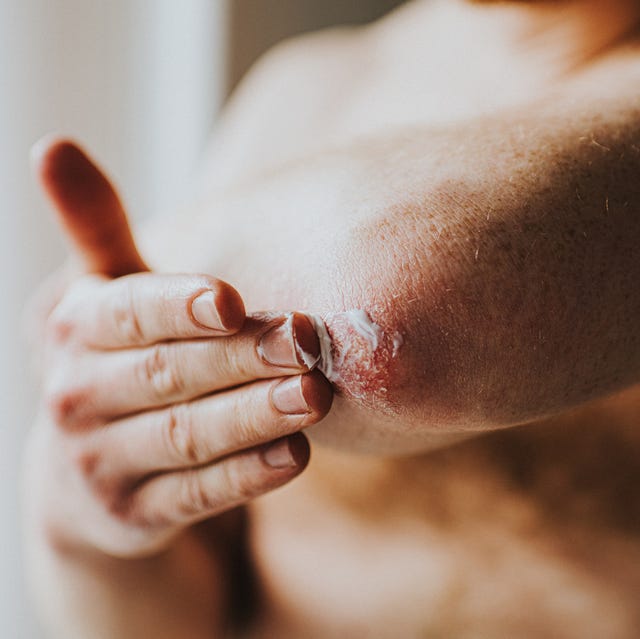From healthdigest.com
Imagine you have a friend (we'll call her Jill) who confides in your that she has been getting rashes, but she can't figure out why. Jill explains that they come and go, and are itchy and sore; sometimes, her skin gets so cracked that it bleeds. Of course, if anyone comes to you with a health problem, you should recommend that they seek out a healthcare professional for a diagnosis. With that said, if you or a friend or a family member is experiencing the above symptoms, they could be signs of psoriasis (via the Mayo Clinic).
Psoriasis can come with a number of symptoms, which tend to occur as flare ups that can last for months. Often, a psoriasis patient will experience rashes on their knees, scalp, elbows, and torso, although it's possible to experience a patchy rash all over most of one's body. Not surprisingly, there are different types of psoriasis, which in some cases are more likely to occur on certain areas of the body. Additionally, psoriasis can go hand in hand with other health problems like psoriatic arthritis and heart disease (via Healthline).
At this time, we are still learning about psoriasis and haven't discovered a cure for it (per the Mayo Clinic). However, that doesn't mean there aren't options for managing psoriasis, including making certain dietary changes.
Avoid: Sugar
If you have psoriasis, it would likely benefit you to avoid added sugars (as opposed to the natural kinds found in, say, fruits) in your diet (via Johns Hopkins). So, you might have to cut out foods like baked goods, soda, and candy.
Large amounts of added sugar can be a very bad choice for a psoriasis patient, since our bodies store that excess sugar in our fat cells. This can lead to the fat tissue becoming inflamed, which is the last thing someone with psoriasis needs. Additionally, added sugar can raise the amount of a type of protein called cytokines. And not only can cytokines cause inflammation, but some believe they might also increase cholesterol and blood sugar levels, creating the perfect storm of events for non-alcoholic fatty liver disease or NAFLD (per WebMD). In fact, Dr. Rheinchard Reyes, a family medicine doctor specializing in adult medicine, says on his website that patients typically have both psoriasis and NAFLD.
With that said, he also noted that the findings of a study from the University of California-San Francisco School of Medicine's Department of Dermatology pointed to reducing consumption of other foods and beverages (like alcohol and gluten) to help psoriasis symptoms. The bottom line is, we cannot say for certain that every person with psoriasis who eats added sugar will experience worsened symptoms. Nevertheless, reducing the added sugar in one's diet is, in general, usually recommended for one's health.
Try: Cherries
If you have psoriasis, then there's one word you should keep in mind — inflammation. While we are still learning about psoriasis, some patients find incorporating more foods that might reduce inflammation into their diet helps them manage their psoriasis better (via WebMD). Case in point: Cherries could be a good anti-inflammatory food for a psoriasis-friendly meal plan.
While it's possible to confuse cherries for berries because of their size, cherries are actually drupes or stone fruits like peaches and olives, per Britannica. According to Harvard Health, stone fruits are good sources of vitamin C. And as WebMD points out, there is research supporting vitamin C being a good nutrient for psoriasis patients. Plus, cherries are loaded with inflammation-reducing phenolic compounds, which are phytochemicals (via ScienceDirect). As the name suggests, phytochemicals are compounds found naturally in plants, per another ScienceDirect article.
Additionally, there's research that cherries might be beneficial for people with health issues concerning cholesterol, blood sugar, and blood pressure (per Harvard Health). They may also reduce one's chances of having an attack from gout. And if you find you're sore after exercising, snacking on cherries might help reduce that post-workout discomfort. Plus, like other stone fruits, cherries have both fibre and potassium. However, even though cherries are potentially good for psoriasis, a slice of cherry pie probably has added sugar, which could be bad for a psoriasis patient, via Johns Hopkins.
Avoid: Alcohol
:max_bytes(150000):strip_icc():format(webp)/drug_news_final_04-c4f9f0c70d7a49559361924728d8fd24.png)
